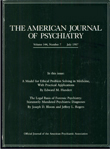PTSD Symptoms in Bosnian Refugees 1 Year After Resettlement in the United States
Abstract
OBJECTIVE: The authors' goal was to describe the characteristics of posttraumatic stress disorder (PTSD) symptoms on resettlement in the United States and at 1-year follow-up among Bosnian refugees as well as possible factors affecting the PTSD symptom profile among these refugees. METHOD: They used standardized instruments to assess 34 Bosnian refugees for PTSD at resettlement in the United States and 1 year later. RESULTS: Fifteen of the refugees were diagnosed with PTSD at 1-year follow-up, compared with 25 at initial assessment. The average PTSD severity score at follow-up was 12.5, compared with 20.6 at initial assessment. At 1-year follow-up, 25 of the refugees experienced a decrease in severity of PTSD symptoms, one remained the same, and eight experienced an increase in severity. Older refugees were significantly more likely to have PTSD than younger refugees, and older refugees had more severe symptoms. CONCLUSIONS: The level of PTSD diagnosis and symptoms in Bosnian refugees remained substantial 1 year after their resettlement in the United States, although there were notable overall decreases. Older refugees appeared to be at greater risk.



